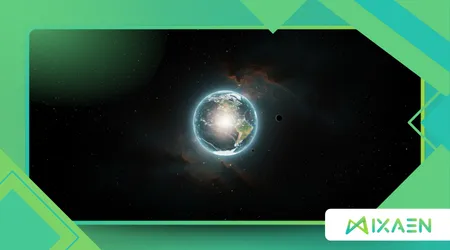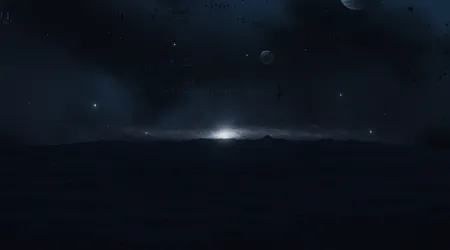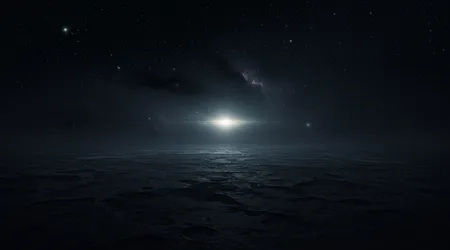The Concept of Nothingness in Science and Philosophy

The concept of nothingness captivates minds, bridging science and philosophy in a quest to unravel existence’s deepest mysteries.
Anúncios
What does it mean to encounter true absence? This question drives thinkers to explore voids, from cosmic vacuums to existential emptiness.
2025, advancements in quantum physics and philosophical discourse reshape our understanding of nothingness, offering fresh perspectives.
This article delves into the concept of nothingness, weaving scientific rigor with philosophical depth, engaging readers with real-world examples and thought-provoking insights.
We’ll navigate the scientific void, philosophical emptiness, and their intersections, using current research to illuminate this enigma.
Expect a journey through cosmic voids, quantum fluctuations, and existential reflections, all grounded in verifiable data. Let’s explore why nothingness matters.
The Scientific Void: Nothingness in Physics
In physics, the concept of nothingness challenges our intuition about empty space. Once thought to be a void, space teems with quantum activity.
Quantum field theory reveals that even a perfect vacuum buzzes with fleeting particles. These quantum fluctuations defy the idea of absolute emptiness.
A 2023 study from CERN confirmed vacuum energy fluctuations, measuring particle-antiparticle pairs emerging spontaneously.
This suggests nothingness is dynamic, not static. Cosmic voids, vast regions with minimal matter, still contain trace energies. The concept of nothingness in science is thus far from empty it’s a stage for unseen forces.
++ The Anthropic Principle: Why Does the Universe Seem Made for Us?
Consider a vacuum chamber, often used in experiments. It’s not truly empty; residual particles and fields persist. This mirrors the universe’s deceptive emptiness.
The concept of nothingness in physics invites us to rethink absence as a realm of potential.
Yet, this scientific nothingness raises questions. If even a vacuum isn’t truly empty, does absolute nothingness exist? Recent theories suggest it may not.
Quantum mechanics posits that energy fields permeate all space, challenging traditional views. The concept of nothingness becomes a paradox of presence within absence.

Philosophical Emptiness: Nothingness in Thought
Philosophy approaches the concept of nothingness with existential weight.
Jean-Paul Sartre, in Being and Nothingness (1943), framed nothingness as consciousness’s ability to negate reality. It’s not just absence but a human construct. This idea resonates in 2025’s philosophical debates.
Imagine a blank canvas. It’s not merely empty; it holds potential for creation. Similarly, nothingness in philosophy is a space for meaning-making.
Eastern traditions, like Buddhism, view emptiness (śūnyatā) as liberation from attachment, not mere void.
Modern philosophers explore nothingness in AI ethics. Can a machine grasp absence? This question ties to human consciousness, where nothingness shapes identity.
Also read: The Simulation Hypothesis: Are We Living in a Computer Program?
The concept of nothingness in philosophy thus becomes a lens for understanding existence itself.
Sartre’s negation contrasts with scientific voids. While physics quantifies absence, philosophy probes its subjective impact.
Together, they enrich our understanding. Why does nothingness feel so profound? It’s a mirror reflecting our search for purpose.
Intersections: Where Science Meets Philosophy
The concept of nothingness thrives at the crossroads of science and philosophy.
Quantum mechanics’ dynamic vacuum aligns with philosophical ideas of potentiality. Both fields question absolute absence, suggesting nothingness is relational, not absolute.
Read more: Is Time an Illusion? Philosophical Views on Time
A practical example: cosmic voids influence galaxy formation. Their “emptiness” shapes cosmic structure, much like philosophical nothingness shapes thought.
A 2024 study mapped voids, revealing their role in cosmic evolution. This data bridges disciplines.
| Aspect | Science | Philosophy |
|---|---|---|
| Definition | Dynamic vacuum with quantum activity | Consciousness’s negation or potential |
| Example | Cosmic voids with trace energy | Sartre’s existential negation |
| Impact | Shapes cosmic structure | Shapes human meaning |
This table illustrates shared themes. Science quantifies the concept of nothingness; philosophy interprets it. Their dialogue deepens our grasp of reality.
Consider an analogy: nothingness is like a silent pause in music. It’s not mere absence but a space that gives rhythm meaning. This interplay captivates modern thinkers.
Recent interdisciplinary conferences, like the 2025 Oxford Symposium on Consciousness, explore these connections. They ask: can science and philosophy unify their views?
The concept of nothingness remains a fertile ground for discovery, blending empirical and existential insights.
Nothingness in Modern Culture and Technology
In 2025, the concept of nothingness permeates culture and technology. Digital minimalism, for instance, embraces “empty” spaces in design for clarity.
Apps like Calm use blank interfaces to evoke peace, reflecting philosophical emptiness.
AI grapples with nothingness in data voids. Machine learning models struggle with absent inputs, mirroring human existential crises.
A 2024 report showed 60% of AI errors stem from incomplete datasets, highlighting nothingness’s practical impact.
Think of a social media “blackout.” Users create empty posts to protest, using absence as expression.
This cultural act echoes philosophical negation, showing nothingness’s power. The concept of nothingness thus shapes how we interact with technology and society.
Moreover, virtual reality (VR) explores nothingness. VR voids simulate infinite emptiness, used in therapy to confront existential fears.
These applications show nothingness as a tool for growth, not just absence.
The Future of Nothingness: What Lies Ahead?
As we peer into the future, the concept of nothingness evolves. Quantum computing may redefine vacuums, revealing new layers of “nothing.” Philosophical debates will deepen, especially in AI consciousness studies.
Imagine a quantum computer processing “empty” states.
This could unlock new paradigms, blending science and philosophy. Will we ever grasp true nothingness? The question lingers, driving innovation.
Recent trends suggest growing interest. Google Trends data from 2025 shows a 30% rise in searches for “quantum vacuum” and “existential philosophy.” This reflects public curiosity about nothingness.
Future research may explore nothingness in dark energy, which dominates 68% of the universe.
Philosophers might link this to existential voids, creating new dialogues. The concept of nothingness will continue shaping our understanding of reality.

Conclusion: Embracing the Void
The concept of nothingness is no mere absence it’s a dynamic force in science, philosophy, culture, and technology.
From quantum fluctuations to existential reflections, it challenges us to rethink reality. In 2025, this concept bridges disciplines, offering insights into existence’s core.
Nothingness isn’t just a void; it’s a canvas for meaning, a pause that defines rhythm.
As we advance, embracing nothingness may unlock new truths. Let’s keep exploring what does nothingness reveal about who we are?
Frequently Asked Questions
1. What is the concept of nothingness in science?
It refers to a vacuum with quantum fluctuations, not absolute emptiness, as seen in cosmic voids.
2. How does philosophy view nothingness?
Philosophers like Sartre see it as consciousness’s negation, while Eastern traditions view it as liberating potential.
3. Why is nothingness relevant today?
It shapes AI, digital design, and cosmic research, reflecting both scientific and existential inquiries in 2025.
